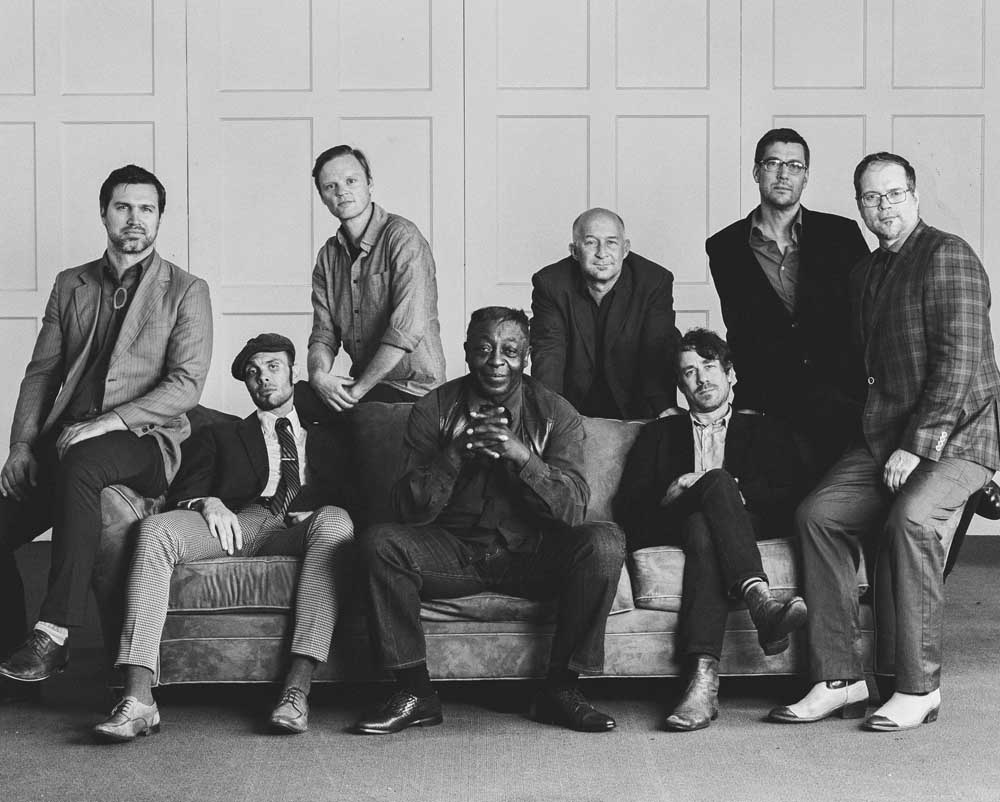No pain, no gain: Ural Thomas returns to Bend
Published 12:00 am Thursday, November 1, 2018

- Portland's Ural Thomas (center, fourth from left), who released a handful of singles in the '60s and performed alongside Otis Redding and James Brown, and his band, The Pain, will return to Volcanic Theatre Pub on Saturday. (Walters Photographers/Submitted photo)
Like many soul singers, Ural Thomas got his start in church.
Born in Louisiana, Thomas moved to Portland with his family in the 1940s, when he was 4. His father, a minister, had been traveling back and forth between the city and the South working odd jobs, and when the family finally relocated to the Pacific Northwest, Thomas would accompany his father to church.
Trending
“I learned how to clean the toilets and stuff like that in the churches,” Thomas said recently from his home in North Portland. His band, The Pain, will return to Volcanic Theatre Pub on Saturday alongside Eugene’s Fortune’s Folly.
“There were several churches that he worked in. I’d put all the hymn books in place in the pews, and I’d put all the other paperwork and stuff. Back in the day, that’s how they used to do it — I don’t know if they still do it the same way — but they’d put all the hymn books out so everyone could learn the songs, and usually, someone would take the songs to a different level and add another verse. That was so magnificent to me. So, I got to learn how to write songs at the same time.”
By the ’50s, Thomas moved to Seattle to kick-start his singing career, staying in the same rooming house frequented by Ray Charles and Quincy Jones, he said. He released a handful of singles in the late ’60s, including “Can You Dig It” and “Pain is the Name of Your Game,” and played more than 40 shows at New York City’s Apollo Theater alongside Otis Redding, James Brown, The Rolling Stones and Stevie Wonder.
But then, Thomas moved back to Portland and disappeared from the public eye. In past interviews, he cited a lack of label support and a few disheartening shows with musical heroes, including Redding and Brown, as contributing to this decision. But when he spoke with GO! Magazine, he didn’t make a big deal out of it.
“I didn’t never really leave the music because I couldn’t; it’s embedded into me,” he said. “But I went and did some things that I knew I could do to make some quick money so I could continue putting my project together. You never know how God’s gonna take you, you know? And so, I ended up with the guys that I really needed to be with.”
Those guys are The Pain, the eight-piece band that has backed Thomas, in his late 70s, since about 2013. The group released its first proper studio album, the appropriately named “The Right Time,” in September, following in the footsteps of Sharon Jones, Charles Bradley and other original-wave soul singers who have experienced career resurgences thanks to the modern-day soul revival.
Trending
While the group released a self-titled album in 2016, many of the tracks were culled from previous singles, including the aforementioned “Pain is the Name of Your Game.” “The Right Time”also features older material, but all of it was rearranged and recorded with The Pain and presented alongside new songs written by the whole band.
“All the guys in The Pain, they’re just as important as me,” Thomas said. “We’re like one family. And so, everybody’s got some of their own input on this album — it’s not just me or Scott (Magee, drummer and band co-founder) or anyone. All the songs that I come up with or they come up with, we work them out together and make them brand-new.”
Magee met Thomas at a jam session. For many years after moving back to Portland, Thomas hosted a public dinner and jam night for neighborhood kids at his home (and although The Pain takes up much more of his time these days, he still hosts the sessions whenever he’s in town, he said).
“A lot of the kids, they don’t have a suitable home life, but when they come here, they become my kids,” Thomas said. “ … I would tell them, ‘You can be anything that you want, all you have to do is believe in yourself. And to do that, you can’t put yourself down.’ And so my purpose was to teach them how to raise up on their own and be proud of themselves.”
Through a mutual connection — Mississippi Records owner Erik Issacson, who reissued a number of Thomas’ singles — Magee, also a DJ specializing in old-school soul, became interested in Thomas’ music and showed up at a jam session.
“He came by and we talked, and he says he was a drummer, so somebody passed him the drumsticks, and we’ve been playing ever since,” Thomas said. “It was great. He just walked in and didn’t know what to do because he’d never been there. We were playing stuff off the top of my head, and I was calling the changes out to the kids. I’d give them a heads up a couple of bars before; they were used to it though, so it was really great. And then, Scott came in, and he just fit right in like a glove, and it’s been that way ever since.”








